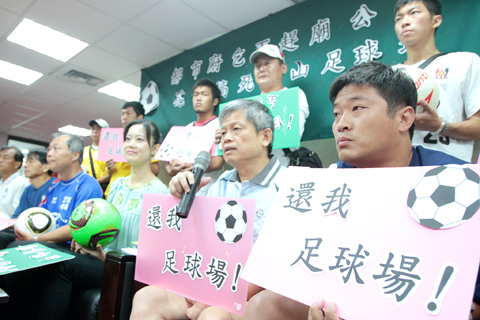The nation’s soccer community voiced its opposition yesterday to a plan by the Taipei City Government to convert the country’s only dedicated soccer stadium into a permanent exhibition hall after the conclusion of the Taipei International Flora Exposition.
Democratic Progressive Party (DPP) Taipei City Councilor Wu Su-yao (吳思瑤) and representatives of local soccer groups said the city government should keep its promise to restore the stadium to its original use after the Flora Expo, to be held from Nov. 6 to April 25.
They said Taipei Mayor Hau Lung-bin (郝龍斌) promised two years ago that the stadium would be closed only “temporarily” to serve as a venue for an indoor floral design competitions and special exhibits during the Flora Expo.

PHOTO: CNA
However, the city government and the Ministry of Economic Affairs now plan to permanently convert the stadium and the surrounding area into a display center for top quality products from Taiwan, Wu said.
“It is really sad for soccer fans that the Zhongshan Soccer Stadium will no longer function as a sports facility because of the Flora Expo,” said Chang Yao-ming (張耀明), a former soccer player who now coaches a soccer team for the Shilin Sports Federation.
Kuo Cheng-deng (郭正典), founder of the Taipei Veterans General Hospital Football Association, also stressed that Zhongshan Soccer Stadium is the only stadium in the country designed specifically for soccer and approved by FIFA for international matches.
“If it is demolished, soccer matches will have to be held at non-soccer stadiums, such as the Kaohsiung Stadium or Taipei Stadium,” Kuo said at a press conference hosted by Wu. “Soccer will therefore have to share limited space with other sports.”
The city government said that it has planned supplementary measures to deal with the issue.
Wang San-chung (王三中), chief secretary of the city government’s Department of Economic Development, said that more soccer fields will be built for the city’s schools with soccer teams.
He also suggested that Yin Feng Sports Park, Bailing Sports Park and Taipei Stadium could all be used for soccer matches.

Alain Robert, known as the "French Spider-Man," praised Alex Honnold as exceptionally well-prepared after the US climber completed a free solo ascent of Taipei 101 yesterday. Robert said Honnold's ascent of the 508m-tall skyscraper in just more than one-and-a-half hours without using safety ropes or equipment was a remarkable achievement. "This is my life," he said in an interview conducted in French, adding that he liked the feeling of being "on the edge of danger." The 63-year-old Frenchman climbed Taipei 101 using ropes in December 2004, taking about four hours to reach the top. On a one-to-10 scale of difficulty, Robert said Taipei 101

Nipah virus infection is to be officially listed as a category 5 notifiable infectious disease in Taiwan in March, while clinical treatment guidelines are being formulated, the Centers for Disease Control (CDC) said yesterday. With Nipah infections being reported in other countries and considering its relatively high fatality rate, the centers on Jan. 16 announced that it would be listed as a notifiable infectious disease to bolster the nation’s systematic early warning system and increase public awareness, the CDC said. Bangladesh reported four fatal cases last year in separate districts, with three linked to raw date palm sap consumption, CDC Epidemic Intelligence

Two Taiwanese prosecutors were questioned by Chinese security personnel at their hotel during a trip to China’s Henan Province this month, the Mainland Affairs Council (MAC) said yesterday. The officers had personal information on the prosecutors, including “when they were assigned to their posts, their work locations and job titles,” MAC Deputy Minister and spokesman Liang Wen-chieh (梁文傑) said. On top of asking about their agencies and positions, the officers also questioned the prosecutors about the Cross-Strait Joint Crime-Fighting and Judicial Mutual Assistance Agreement, a pact that serves as the framework for Taiwan-China cooperation on combating crime and providing judicial assistance, Liang

US climber Alex Honnold left Taiwan this morning a day after completing a free-solo ascent of Taipei 101, a feat that drew cheers from onlookers and gained widespread international attention. Honnold yesterday scaled the 101-story skyscraper without a rope or safety harness. The climb — the highest urban free-solo ascent ever attempted — took just more than 90 minutes and was streamed live on Netflix. It was covered by major international news outlets including CNN, the New York Times, the Guardian and the Wall Street Journal. As Honnold prepared to leave Taiwan today, he attracted a crowd when he and his wife, Sanni,